Description
Introduction The book Every Time I Find the Meaning of Life, They Change It
Every Time I Find the Meaning of Life, They Change It. Many classical and modern philosophers, from Epicurus to Camus, have come together to give us a new understanding of life and its daily routine. In this book, “Daniel Martin Klein” tries to show a new face of philosophy to the audience by using his experiences and academic knowledge.
In this book, the author focuses mostly on Western philosophy and does not talk much about Eastern philosophy and schools, except for a brief reference to Buddha and Eastern mysticism. Although Klein makes every effort to achieve the meaning of life through logic and reason, he still achieves spiritual problems. For this reason, traces of different religions and mirrors can be seen in his book.
To the extent that it criticizes modern philosophers who do not believe in God and gives strong answers to these people. In fact, the search for the meaning and concept of life is the main goal of the author and his motivation for writing this book. Earlier, Justin Gorder had recounted philosophy in a sweet and easy language in his book The Sufi World. For those who are always confused about philosophy and its strange schools, reading such books is a good way to start philosophical studies.
About the book They changed it every time I understood the meaning of life
Klein has boldly chosen a full title for his book that reveals one of his main messages: “There are many ways to live and enjoy it.” In writing this book, Klein uses the basic concerns and questions that were posed to him in his youth. His searching mind went so far in his youth that he now thought of the meaning of “meaning.”
In his view, this was one of the logical and fundamental issues. He believed that if we did not know “what is the meaning of the meaning itself, then it did not make sense to be confused and confused about the meaning of our lives and the lives of others.” He, who is studying philosophy, thought that he was about to enter society as an independent and adult as he approached graduation, but he was still confused in his philosophical books to see what he should do now and how. To live.
Until he hears a saying from John Lennon that “life is what happens to you, just as you are busy with other plans.” It was here that Klein came to the conclusion that philosophers throughout history have always been involved in life and the universe, and each has seen life through the lens of his own mind. For someone like Schopenhauer, the purpose of life is happiness.
However, he admits that it is almost impossible to achieve this goal. “Life is like a pendulum swinging between suffering and boredom,” says one philosopher in the same book. Now, if you can find an opportunity for joy and happiness in this endless journey, you are close to the goal of life. But Epicurus, a hedonistic philosopher, also believes that in order to have a better life, you must enjoy the present. Because this is the best possible way of life. Camus, meanwhile, says that if you search for the meaning of life, you will never find it.
Sartre, on the other hand, believes that life is not something we discover, but something we must create. Among all these theories, the author’s curious and questioning mind seeks to find the correct definition of life from a philosophical point of view. He examines all these different theories and views in simple and fluent language and expresses his personal opinion about each of them. He even gives a few examples from his own life and those around him that make it easy to understand all of these things and apply them in everyday life. At the same time, it makes the atmosphere of the book not so boring and boring.
The ending of the book is very attractive, honest and impressive in its kind. “Well, did you understand the meaning of life?” Klein writes at the end of his book. Who am I joking with? Who am I hiring? “Who am I?” Not only does the discussion of life and its meaning not end here, but another new question arises: Who am I? And is it possible to have different “selves” according to different meanings of life? Such issues never seem to work.
Always on the way to finding the answer to a question, we come across other questions that may change the course of exploration. Of course, the author believes that this is the right way to ask the question, because no theory or belief can be absolutely correct. And a professional philosopher is someone who expresses his or her views based on a sequence of questions. As Bertrand Russell puts it, it is the ambiguous and uncertain nature of the answers that turns these questions into philosophical questions.
Because otherwise, they were considered scientific issues. In Klein’s view, Wittgenstein was right when he said, “Eternal life belongs to those who live.” With all these different ideas and theories, man is a free and independent being. Anyone who lives as he pleases, a devout Christian, a freedom fighter, or an unemployed and unmotivated person, can all enjoy the same way of life they have and excel in it.
At the end of the book, Klein devised an interesting dictionary in which he defined all philosophical and intellectual schools in a very easy and eloquent language. By introducing these terms, he gives young and young readers of philosophy the opportunity to get acquainted with its schools before any specialized study of philosophy.
About the Author Daniel Martin Klein
Daniel Martin Klein is an American author who studied philosophy at Harvard University as a young man. He worked in television shows for a while, but after a while he decided to focus on writing. He was able to write many books in various fields of fiction, non-fiction and humor, many of which were among the bestsellers of the book and attracted positive reviews from critics and audiences. Every time I understood the meaning of life, he changed it, used the writings of his student days in a booklet called “Brief and Useful”, and by collecting his manuscripts, he was able to create a popular and influential book.
The translation of the book was changed to Persian every time I understood the meaning of life
Every time I understood the meaning of life, the book was changed by Hossein Yaghoubi into Persian. This young and at the same time experienced translator was able to provide the audience with a fluent and pleasant translation of the book. He has tried his best to make the concepts and definitions of the book perfectly consistent with the author’s original text and font. Where the author has spoken with humor and familiar language, Yaghoubi has also tried to convey the same feeling and mood to the Persian text. Hossein Yaghoubi is a translator, writer, playwright and journalist from whom many translations and works have entered the book market.
In a part of the book, we read that every time I understood the meaning of life, they changed it
When Indian and Ceylon tea entered the English market in the mid-seventeenth century, enthusiasts of its handwriting wrote exaggerated articles about the joy and vivacity they experienced after consuming this mesmerizing drink. Some wrote that they could not sleep until a few days after drinking tea. An eighteenth-century commentator had predicted that tea consumption would become so widespread that tea addiction would soon be rampant throughout Great Britain.
So on this account, why does a typical 21st century London housewife who consumes five cups of tea a day seem so calm and free of excitement? Because teas have had stronger and more powerful effects in the past? It seems unlikely. This is probably because intoxication or drunkenness in any period is always related to the definition of “normal” at that time, common to both individuals and the culture in which one lives.
It should be borne in mind that over the centuries, everyone in the UK has gradually experienced the aftermath of tea. This does not mean that everyone there has experienced drinking tea. Rather, it means that tea is drunk by a large number of people in society and their mood after drinking is accepted as a soft social behavior … This is exactly the effect that computers and social media have over time on behavior and They have left our speech, awareness and cultural understanding, without us realizing it.
The selected sentences of the philosophers in the book changed every time I understood the meaning of life:
– Do not waste the pleasure of what you have, with the desire and desire of what you do not have. Remember, what you have now is what you once dreamed of. (Epicurus, hedonistic Greek philosopher)
– The art of living is to seek in every moment and every place, and the most delicious and lasting pleasures are neither mental nor always moral. (Aristotle, hedonistic Greek philosopher)
Genetic engineering and nanotechnology will obliterate all the sufferings of emotional life. This project is ambitious but technically feasible. It is also instrumentally logical and morally binding. (David Pierce, hedonistic British philosopher)
– Life is like a pendulum that constantly fluctuates between suffering and boredom. (Arthur Schopenhauer, German philosopher)
– The first stage of free will is the belief in free will, a will focused on belief. (William James; American pragmatist philosopher)
– The secret to getting the most fruit and the most pleasure from life is to live dangerously. (Friedrich Nietzsche; German philosopher)
The pleasures of the mind are at least as important as the pleasures of the body. (Bertrand Russell; British humanist philosopher)
– One of the advantages of old and intimate comrades is that you can be yourself in front of them. (Ralph Waldo Emerson; American philosopher)
In a part of the book, every time I understood the meaning of life, they changed it and we read:
Safe from the bittersweetness of this cosmic joke. No one like Samuel Beckett has been able to portray the humor of the empty world to us with its subtlety and violence. Especially in his masterpiece; waiting for Godo.
This play is all about the struggle between frankness and inversion, hope and despair. Listening to or reading Estragon and Vladimir’s conversations about the inevitable emptiness of their lives makes us laugh. When we realize that their ideas about our own lives are true, we laugh again, but not out of joy this time.
Watching a scene waiting for Godot was so impressive to me that I immediately bought and read the script and wrote the dialogue in my notebook. In addition to the drama’s comic perspective on human life, it particularly impressed me and reminded me of bittersweet memories.
When Tom and I went to college, we usually went out at night and sat on the stone steps of the dormitory and did imaginary things. I do not know how the idea of this game came to us, I know that we did not get drunk was probably a youthful passion. A kind of treatment I came up with to control our stress and anxiety to enter the world of adulthood and the job market, a way to divert our thoughts from stressful issues and a way to play with our anxieties. At the time, Tom was planning to go to theology, but he was hesitant to become a priest, and I had no plans for the future at all.
One night as we sat on those steps in the midst of final exams, we began to think about the letters we were going to write to each other at Christmas in the future when we grew up apart.
Daniel Martin Klein is a Harvard graduate who has authored five novels and two nonfiction books. He has also authored twelve non-fiction and generally other philosophical books. His two most famous books are “Plato and Nordic Fruit” in collaboration with Thomas Katcart and “Journey with Epicurus”. The first book was one of the best-selling books of the New York Times, and the second book was one of the best-selling books of the London Times.
After graduating from Harvard University, Klein starred in television comedy. Did not stay in this job for long; But his sense of humor remained. Then he started writing: from the horror genre to fiction and humorous books about philosophy. In the following books, Klein teaches philosophy to readers through jokes:
“Plato and the Knight Rise,” “Aristotle and the Ant-eater Go to Washington,” and “Heidegger and Hippo Go through the Pearl Gates.”
Two famous books by Daniel Klein: “History Now” and “Plato and Nordic Fruit”. His other important books are:
Non-fiction books
The Semi-Jewish Book: Commemoration (2000), in collaboration with Fark Wojest;
Plato and Nouckard: Understanding Philosophy through Joke (2007), in collaboration with Thomas Katkart;
Aristotle and the Ant-eater Go to Washington: Understanding Ambiguous Language through Philosophy and Joke (2008), in collaboration with Thomas Katkart;
Heidegger and Hippo Pass through the Gates of Pearl: Using Philosophy (and Jokes) to Search for Life, Death, Life After Death, and Everything Between It (2009), in collaboration with Thomas Katkart;
Journey to Epicurus: Journey to the Island of Greece to Find Meaningful Life (2012);
Each time I found the meaning of life, they changed it: the wisdom of the great philosophers in response to how to live (2015);
I think so, I design: Understanding Philosophy through Caricature (2018), in collaboration with Thomas Katkart.
Magical Time (1984);
Date Now (2009);
Nothing is serious (2013).
Plays
Mangelberg and Mayer (2010);
The Jewish Clown (2013).
The main question of the book is: What is the meaning of life? This is a question that has occupied Klein since his youth.
The title of the book is taken from one of the short sentences of Reinhold Niebuhr, an American philosopher and theologian who was very active in the socio-political field. This sentence is a humorous allusion to the author’s view of the meaning and place of life and the effort that various philosophers have made to find it. In this book, we come across quotes from great philosophers, and below we will find Klein’s detailed and sometimes sarcastic references and answers to some of the questions.
The main question of the book is: What is the meaning of life? This is a question that has occupied Klein since his youth. How can you experience a better life? Because of this, Klein went to Harvard University to study philosophy. Fifty years later, something other than the philosophies of David Hume, John Stuart Mill, William James, and Albert Camus warms his words: a sense of humor. Humor is not the kind of joke that only makes you laugh; Rather, humor in the same wise sense that we find in Woody Allen’s films. Klein looks at the wise words of each of these philosophers and measures them by the scale of life today to derive meaning from them on earth today.
The content of the book Every Time I Find the Meaning of Life, They Change It
This small book has a simple structure: introduction, main text and conclusion. In the original text, the author first quotes each philosopher and then adds explanations to them with his sweet and heartfelt literature.
The list of philosophers chosen by Martin Klein for his book is very wide: from Greek and Roman philosophers such as Aristotle, Epicurus, Aristotle and Gregory to Renaissance philosophers such as Niccolo Machiavelli and modern philosophers such as David Hume, Arthur Schopenhauer, Friedrich Nietzsche Mill and even contemporary philosophers who are still present in public, such as Sam Harris and Joshua Green.
Is this book for you?
The audience of Klein’s works is all people. He sees philosophy as not an academic endeavor in academia, but something that people face on a daily basis. Klein invites his readers to think more deeply about their daily experiences and to associate every moment of their lives with the joy of philosophy. He urges his readers to immerse themselves in the original meaning of things beyond appearances. Thus, the addressee of this book is anyone who seeks the meaning of existence and life.
Parts of the book changed every time I understood the meaning of life
“Safe from the bittersweetness of this cosmic joke. No one like Samuel Beckett has been able to portray the humor of the empty world with subtlety and violence for us, especially in his masterpiece “Waiting for Godot”.
Watching a scene from “Waiting for Godot” impressed me so much that I immediately bought and read the script and wrote the dialogue in my notebook. “In addition to the drama’s comic perspective on human life, it impressed me in a special and personal way and reminded me of bittersweet memories.”
***
“As a kid, I used to think about what my life would be like when I grew up. Later, as a teenager, I thought about what my life would be like after graduation, and so life went on and on. I somehow watered down my life! Ralph Waldo Emerson makes a good point about my life: “We are always preparing ourselves for life; “But we will never live.”
***
“For example, if you are going to succumb to the temptation to betray your spouse, consider the complexities of planning, the anxiety of the action, and the guilt after the operation, and think, is it worth the pleasure you get from it?” Epicurus refers to the old adage, “Be careful what you desire; “Because your wish may come true.”
Part of the text of the book
Life is like a pendulum swinging between suffering and boredom.
Arthur Schopenhauer, German philosopher (1860-1788)
Yes, I admit that many times I, like many others, need a dose of pessimism. Especially in a difficult time when I am dealing with an unresolved problem. According to the psychoanalyst, to think that when life is dirty for me, dirty for the world and man, is a kind of sweet mental poison. In that case, who better to find than the master and god of melancholy – Arthur Schopenhauer -? I do not remember exactly when I wrote this in my notebook, but it was certainly one of those times when I felt like time and space went hand in hand to knock me to the ground.
It is hard to believe, but in a way Schopenhauer is a hedonist because he considered happiness to be the main goal of life. Well, on the other hand, he believed that achieving this goal was practically impossible.
Just like Epicurus, Arti saw joy and happiness in the absence of suffering and fear, and again, like Epicurus, he believed that lowering our desires and expectations was the definitive way to break our sorrows and deprivations, saying, “This is the safest way to not be too miserable.” “We do not expect to be very happy.” (Be careful! Schopenhauer uses the word miserable, not unhappy and sad, for example.)
“The shortness of life, which is often unfortunate, may be its best,” he writes in his famous book The World and the Will.
And in the book “The futility of existence” he points out:
Human life is a kind of mistake.
The truth of this claim is obvious, if you only notice that human beings are a combination of needs and necessities that are difficult to satisfy and when they are satisfied, they become boring and boring issues. The obvious reason is that existence has no real value in itself.
1- Introducing the book Every Time I Find the Meaning of Life, They Change It on YouTube
2- Introducing the book Every Time I Find the Meaning of Life, They Change It in Aparat

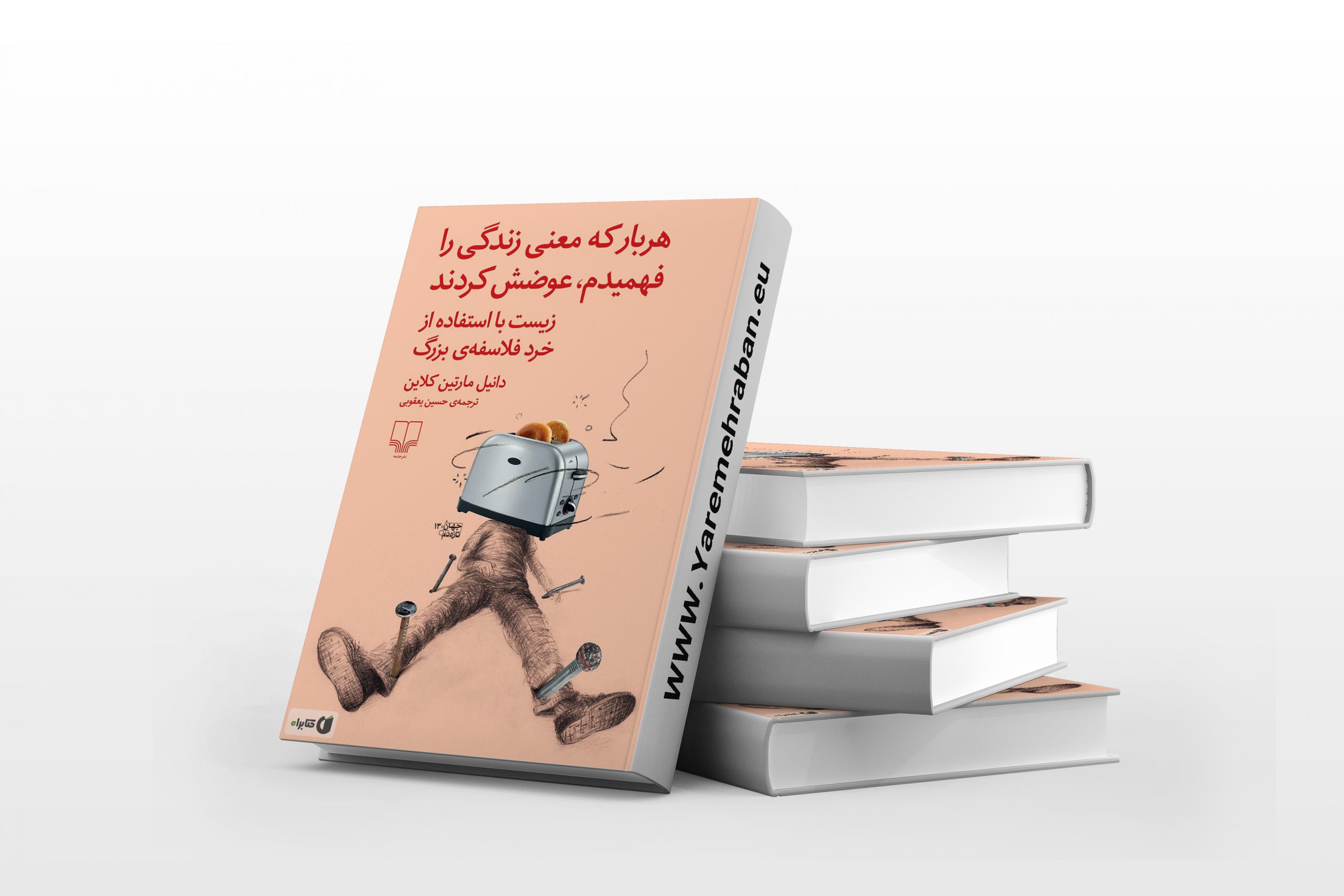
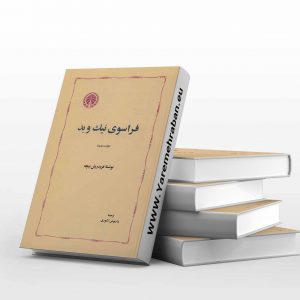
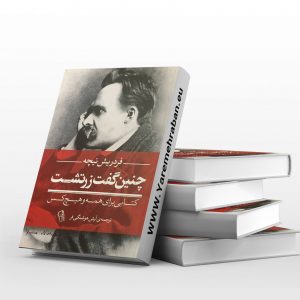

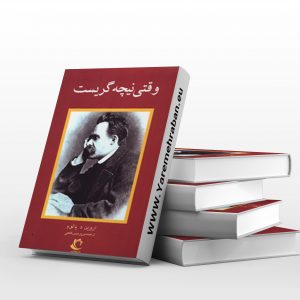






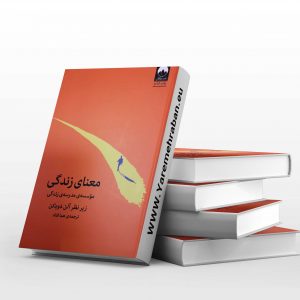

Reviews
There are no reviews yet.